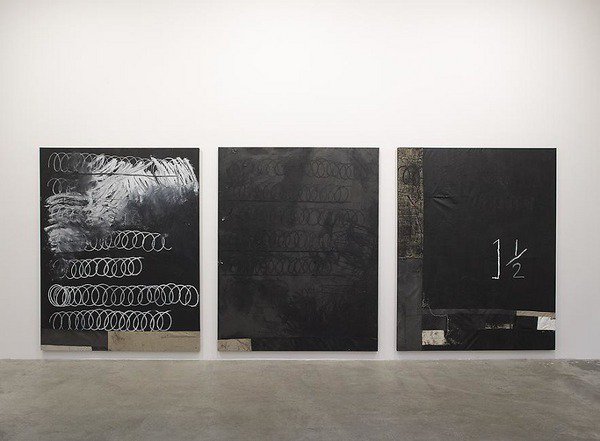Oscar Murillo
dal 22/5/2014 al 17/7/2014
Segnalato da
22/5/2014
Oscar Murillo
Marian Goodman Gallery, Paris
We Don't Work Sundays. This exhibition incorporates the full spectrum of his practice, including new paintings, drawings on paper, sculptures and video projections. Much of this show is derived from what some working-class Colombians create in anticipation of their leisure activities.

Marian Goodman Gallery Paris is pleased to present Oscar Murillo’s first solo exhibition in France. We Don’t Work Sundays is the third of the Colombian-born British artist’s trilogy of recent exhibitions, at the South London Gallery and The Mistake Room in Los Angeles, dwelling on the aesthetics of shared labour. This exhibition incorporates the full spectrum of his practice, including new paintings, drawings on paper, sculptures and video projections.
Shaped by Murillo’s interest in the meanings behind object-making outside of artistic production, much of this exhibition is derived from what some working-class Colombians create in anticipation of their leisure activities. And, as with his previous projects, Murillo has engineered collaborations between incongruous groups, leading to works that counter the social hierarchies and cultural displacement he’s experienced.
“My life itself has been about labour and physicality, and manipulating materials in a physical way. Those experiences definitely inform my relationship to [art].…Regardless of the idea of segregated societies, via economic status or social class, we are segregated individuals by default. I think a lot about this and how art fits into it…Any opportunity of artistic achievement comes with an opportunity to infiltrate a social class that is closely linked to art–art making, art appreciating, etc. I personally entered foreign territory with these opportunities. Since then I’ve wanted other individuals to be part of this experience…”
Oscar Murillo interviewed by Cesar Garcia, in L’Officiel Art, March 2014.
The premise for We Don’t Work Sundays lay in Murillo’s conversation with a group of Afro-Colombian amateur musicians who’d created their own basic instruments: his principal interest being that they were objects made for an entirely recreational and social, not financially motivated purpose. This encounter led to him musing on what people of all cultures make and do in preparation for life outside of employment: the labour they invest in not-working.
Each year, the western Colombian city of Cali – known colloquially as the ‘Capital de la Salsa’ – hosts the Feria de Cali, a festival of carnival parades, athletic and equine events, and a salsa marathon, engendering ethnic and cultural diversity in the region. Residents spend months creating costumes and rehearsing dances in preparation for the week’s events. For this exhibition, Murillo collaborated with fashion students from l’Ecole Duperré (Ecole supérieure des arts appliqués Paris), first showing them his video of the amateur musicians, then inviting them to revisit Feria de Cali costumes through their own haute couture experience.
Prior to the exhibition’s opening, he filmed ballerinas wearing the fashion students’ costumes and practising salsa moves. He recorded them trying to set their classical training aside to embrace a dance form that is in many ways antithetical to all they’ve been taught, and the ensuing video, others shot in Columbia and the students’ garments will all inhabit the basement gallery.
Murillo continues this inter-cultural stratifying elsewhere. He shot images of generic, faux-antique ‘Far Eastern’ objects from an event he’d instigated in Berlin and sent these, along with photographs of his food-packaging works from the South London Gallery show, to Dafen Village, China. He commissioned master draftsmen there to make verbatim copies of them as drawings. These will be hung among his paintings and sculptures on the ground floor, augmenting Murillo’s distillation of ostensibly disparate cultures, art forms and traditions throughout this exhibition.
Oscar Murillo was born in La Paila, Colombia in 1986 before moving to London with his family aged 10. He graduated from Westminster University, obtained an MFA from the Royal College of Art, and currently lives and works in London.
In 2012 he organised the event The Cleaner’s Late Summer Party with Comme des Garçons at the Serpentine Gallery to which he invited people from the art world and members of London’s Colombian community. The same year Murillo was invited by the Rubell Family Collection in Miami to create a series of paintings entitled Work. Murillo has taken part in various international group exhibitions, the most recent of which was the first International Biennial of Contemporary Art of Cartagena de Indias, Colombia, 2014.
The artist would like to thank the students of Ecole Duperré for their collaboration: Robin Abrial, Chloé Adelheim, Valoris Bertin, Pauline Bonnet, Camille Bovin, Pauline Comte, Thomas Friedlander, Clément Garcia, Coline Gauthier, Valentine Genelot, Samantha Gil, Kelly Godeau, Anaïs Guinchard, Emma Gschwindt, Mathilde Hostein, Julie Lemaréchal, Kim Manto, Geoffroy Nicolaï, Samuel Nicolle, Fanny Noël, Ninon Parlouer, Alexandre Paysan, Bérenger Pelc, Julien Peraldi, Lisa Piazzoli, Claire Pontié, Capucine Raoul, Yann Roussel, Fanny Terno, Lola Verstrepen, Jun Zheng Zhao.
Marian Goodman Gallery
79 Rue Du Temple 75003 Paris
Hours:
Tuesday - Saturday, 11AM - 7PM



